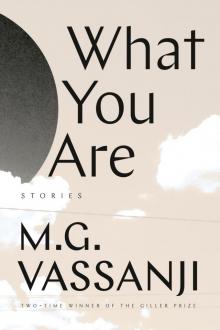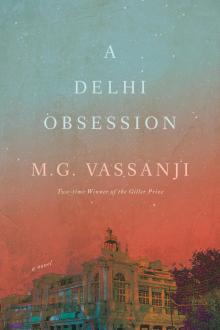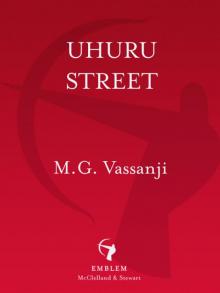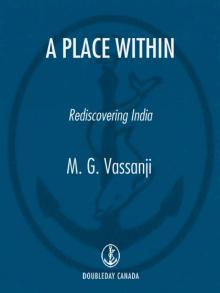- Home
- M G Vassanji
Amriika Page 5
Amriika Read online
Page 5
Get away for Christmas, his Ethiopian friends told him; unless you want to risk jumping down from the fifth floor into that ultimate abyss. It is the worst time in America — if you don’t have anyone. Last year it was Rich Corey, and he belonged here. Richard Corey? You’re having me on — isn’t he the fellow in the Simon and Garfunkel song? Same name, same fate; only, this Corey jumped. Why? Loneliness, perhaps; LSD; couldn’t make the grade — who knows, could be a combination of all three. This first Christmas, get away to your host family. Phone them, they’ll invite you. They always invite you. Americans are kind.
The fifth floor had three Ethiopians, all bright, among the cream of their poor country’s student crop, all waiting for the downfall of their diminutive but unshakeable emperor Haile Selassie. Ebrahim, Marek, and Tekle, of whom the first was tall with a halo-like Afro haircut, and an admirer of Dostoevsky’s Crime and Punishment, a constant drinker of sweetened black tea, and a teller of Haile Selassie jokes. He and Ramji had developed a warm friendship, though they had yet to become close. Marek had a quiet, mousy American girl spending nights with him, and Tekle, as tiny as his emperor, was at his books day and night.
Hey Ramji, have you heard the one about Ethiopia’s space flight to the sun?
To the sun?
You haven’t heard it then.
No, tell me. And I’ll tell you the one about Nehru and Nyerere stealing flatware at Buckingham Palace.
Listen, says Ebrahim. You know that Haile Selassie always says, For everything we do, we think twice — that’s the royal “we.” Well, last year UNESCO held a space conference for the benefit of Third World countries. Okay, you didn’t hear about it, but it’s true. Each leader was asked: Where, in the future, would you like to send your spaceships?
Yes?
Well, some said Mars, some Venus, many said the moon. When it was the turn of the King of Kings, the Lion of Judah, he said, We would like to send our men to the sun.
UNESCO thought these Ethiopians must have some ancient scientific wisdom they hadn’t revealed to the world. The Americans and Russians were curious. “Tell us,” they said, “how you can send astronauts to the sun when advanced countries like ours can’t. Do you know how hot the sun is?”
Haile Selassie smiled. He said, “For everything we do, we think twice. We will send a rocket to the sun at night!”
And now, tell me about Nehru and Nyerere.
Later, said Ramji. But tell me, how come you’re not going to your host family?
Ebrahim’s smile was part sheepish, part defiant. It turned out that on his first visit there he’d been accused of making a pass at one of the two daughters of the family.
Shame on you, said Ramji, how could you? And then: Did you do it? How old was she?
A tight-lipped silence. I don’t have to tell you, the expression on Ebrahim’s face seemed to say, I know what I know. And that’s what stood between them, Ramji thought, what couldn’t draw the bonds of Africa any closer: the feeling of black anger and the defiance that was an expression of “black power.”
And so he was going to spend his very first Christmas at the Morrises. It was going to snow, it would be a white Christmas, the forecast said so. He had known Christmases only through storybooks — images of stockings, Father Christmas, and snow. Back in Dar, a shop not far from where he lived had stuck a cottonwool beard on a roly-poly red doll to improvise a Santa Claus for its display window, in a background of cotton-wool snow and matchbox houses and a zebra-drawn carriage to make a Christmas scene that had drawn large crowds of viewers.
How do you behave at Christmas? He hadn’t an inkling. Do you go around shaking hands, the way you did on Eid, and saying “Merry Christmas”? Shawn had coached him on what to expect, though Shawn had only contempt for the bourgeois likes of John Morris.
Ramji had practically begged for the invitation, hand outstretched. John had picked up the phone when Ramji last called, and when Ramji said he had no plans for Christmas, John had said: “You’re welcome to spend it with us.” And Ramji, demurring only a little, had accepted. He was ashamed, and a little angry at himself for his cravenness. But the alternative was to spend a week totally alone. Sona would spend the Christmas with a professor from Harvard who had befriended him, and the Ethiopians would be up to something or other together. Still, he vacillated over whether or not to go; then Ginnie called to make sure he was coming. We thought you had made other plans — so good you called, we all look forward to seeing you again.
On the morning of the twenty-fourth he took a ride with two graduate students, a small, wiry girl with short blonde hair called Gudrun and her equally small but dark and long-haired Pakistani boyfriend, Sam, who wouldn’t tell Ramji his real name. Ramji paid six dollars to be dropped at Newark’s train station, and there was a possibility of a return ride on New Year’s Day.
“Ramji, you’ve let your hair grow!” Ginnie said when he arrived.
“More convenient,” he said, a little embarrassed.
“You look wonderful. It’s nice to see you.” She gave him a peck on the cheek.
They tried to treat him as matter-of-factly as they could. Over dinner the boys talked about their visit to New York that day, and Ramji told them all about his ride from Cambridge. Chris asked, “Is the antiwar movement strong on campus?” and Junior burst out, “If I hear another word about those jerks —” while Ramji replied, “Yes — it’s all over the place. My roommate’s an SDS guy — you don’t get to pick roommates …,” and Ginnie smiled indulgently.
After dinner the boys brought out their wrapped presents and placed them under the large brightly lit Christmas tree, which dominated one corner of the rarely used living room. Ramji said he had brought a few things along — could he also place them under the tree? Then, after coffee and pie, he sat up with Chris to watch “The Dick Cavett Show.” “Is there an antiwar movement in your school?” he asked, in a bid to continue their previous conversation.
“Some,” Chris said. “A few of us get together and talk about it. But it’s a military school — a fascist place. I’m getting out of it.”
Ramji realized he was treading dangerous waters and decided not to pursue the subject further.
He woke up in the middle of the night, his eyes fixed on the small attic window of his room, with the strange feeling that someone had been peeping in and had just then ducked out of sight. He shook himself out of the weird thought. It was simply the effect produced by the sudden sight of the glow outside. Something’s lighting up the world at night, and I know what it is. He tiptoed to the window and looked out, his forehead pressed against the cold glass. Soft white snow clung to bending, pliable tree branches, there was snow on the rooftops and the ground everywhere, gleaming under streetlamps, porch lights, Christmas lights, imparting a quiet, heavenly beauty to the world. I wish I could tell someone about this; someone from there, who would understand what I mean. It’s unfair to see and not be able to tell! Grandma with your ancient medicines, and your rejection of the world, what would you make of all this glory?
He hardly slept, couldn’t help pondering: what combination of fate, circumstance, and divine purpose had brought him here? Why you, here, somewhere beyond the wildest dreams of your past?
The next morning he went down late, purposely, so as to be the least imposing on the family on this special day. Does breakfast come first or do they open presents? Am I dressed properly? …
They were all waiting for him as he arrived downstairs, turned beaming smiles upon him — Chris and Junior on the floor, John on an antique wingback chair, Ginnie hovering in the middle, a tray of glasses in her hands. The Christmas tree sparkled in its corner; the fireplace was crackling.
“Merry Christmas,” he said shyly.
He was overwhelmed with presents, showered with beautiful things. A sweater from Scotland, a silver pen set, a pocket radio, things he would treasure for years; and socks, a diary, an alarm clock; anti-dandruff shampoo. In his turn he gave John a biography
of Eisenhower, Chris a book on Eastern religions, Junior a calender, and Ginnie a bottle of perfume. All inappropriate, perhaps, but he hadn’t known how to shop for Christmas presents. Shawn, ever contemptuous of imperialist pigs, had been no help here: take them Abbie Hoffman’s Steal this Book, was his suggestion; he himself had given his Catholic father the radical priest Daniel Berrigan’s memoir. And so Ramji had come with his meagre offerings, and was swept away by an avalanche of goodies, all thoughtfully chosen.
That week he learned about football and its pageantry, watched all the Bowls on television. Midweek, Gudrun called from Philadelphia and said she could pick him up on the first of January if he wanted. Apparently she was short of riders, and she sounded keen. Without thinking, he said all right. He gave her the address and she told him what time to expect her. No sooner had he made this arrangement than he found out about the family’s plans, mentioned rather casually to him. Chris and Junior were on their way to spend the rest of their holidays with a cousin in Annapolis. John announced he would go to Baltimore later in the week to spend some days with his mother; Ginnie said she would join him on the first.
“I didn’t mean to inconvenience you,” Ramji said rather guiltily. Christmas over, he wished he hadn’t come. It wouldn’t have been so bad, had he stayed on campus, the days would have passed. He’d given the Morrises such short notice, they must have scrambled around looking for presents for him. It was clear now why he hadn’t been invited at first. Perhaps he should have planned to return immediately, the day after Christmas … but wouldn’t that have looked awkward, as if he’d come only for the loot?
“Nonsense,” Ginnie told him. “You’re one of the boys. You come whenever you feel like it, just as they do. John’s mother needs him around this time of the year, and he has to go. She’s a darling, but deaf as a doorpost, so it’s hard for me to visit for long. I’d much rather prefer your company instead!”
John left on the early morning of the thirtieth. That day and the following Ramji spent with Ginnie as she went about in her Grand Prix running errands for the home. The first day she took him skating, at which he proved a disaster, though he enjoyed the experience. The next day they went to her club for lunch, where she showed him off to a gaggle of women — all in some ways reminding him of her and all extremely nice to him — and introduced him to their art teacher, Pierre. They all took a class from him at the Runymede Community College. “He’s a riot,” she said, when they’d sat down to lunch by themselves, then whispered, “There’s more than one husband ready to shoot the guy. You know what I mean? And I don’t think he’s even French.” Pierre was a few tables away, sipping wine with dessert in the company of a young woman.
“This chicken we’re having is cooked in a smidgin of red wine — I hope that doesn’t bother you,” she said blithely.
He laughed. “I guess not, if it’s cooked. A smidgin would evaporate.”
Ginnie’s friends came over in ones and twos for brief chats and New Year’s wishes, beaming large flashy smiles at him, which he amply returned.
“Don’t be too flattered by their attention,” she told him. “They’re predators.”
“Really,” he said, a little too seriously, and they laughed.
“I’ve warned you.”
On New Year’s Eve night he sat in the den and watched on TV the celebrations going on in New York. Guy Lombardo led his band in the Waldorf-Astoria ballroom, while out in Times Square the great suspended ball of lights slowly edged its way downwards, indicating the minutes left in the old year to the gaze of thronging crowds. Ginnie came and sat on the arm of the couch and watched with him. “Let’s celebrate together,” she said suddenly, “and to hell with the rest of the world. Right?”
“Right,” he replied, unsure of himself. She got up and brought two glasses of wine. “No,” Ramji said, “please — I can’t have wine.”
“Not even to celebrate? Not even a smidgin with me?”
“No,” he said, “I can’t …” He looked at her pleadingly. He wished he could oblige her, but how could he?
“Never mind,” she said, “you can have some ginger ale. Surely that’s allowed?”
“Yes, that’s fine.” He felt relieved.
“You are very observant, aren’t you. I mean you —”
“Yes … that’s how I was brought up. That’s how everybody was. It’s a matter of faith.”
“Do you pray? I’m being nosy, aren’t I? John always tells me I’m nosy …”
“Yes.” He looked up at her. “I pray regularly.”
“Every day? Before you go to bed?”
“Every morning when I wake up, and at night before going to bed. Actually the times are dawn and dusk … but that’s not convenient here …”
“What do you pray?”
“Well …,” he began but didn’t quite know how to answer her.
“I’m prying, I know. You’re so nice and good natured.”
Meanwhile on the TV the final countdown had begun, “Nine … eight … seven …,” chanted the crowd, and at the stroke of midnight the ball of lights touched bottom as the Lombardo band began the first strains of “Auld Lang Syne.”
Ginnie sang along and said “Happy New Year!” and gave Ramji a hug and they too kissed as did the crowds at Times Square amidst much honking of cars and wild cheering.
“Happy New Year,” he said to her, extremely moved by the moment. “You’re one of the nicest people I’ve ever known!”
“Oooh, thank you.…” She wiped tears from her eyes. “I feel so sad this time of the year.…” They hugged again. “My makeup’s running.…When is your ride coming — it’s Gudrun, is it?”
“Yes, at noon. Is that late for you?”
“A little. I’ll leave at eleven and you can go whenever the ride comes. Just make sure the lock catches when you close the door — you’ll have to pull it tight. Will you remember to do that?” She sniffed, smiled.
“Yes, I think so.”
“I’m sure you will.”
“Good night. And thank you for everything.”
“You are most welcome. But I’ll see you before I leave. Good night.”
In his attic room he looked out the window at the trees now bereft of snow, ghostly and barren, though the roofs were still covered white. A solitary figure, huddled in a coat, had appeared on the street, mesmerizing in its singularity and the distant regular sound of footfalls. Most likely someone returning from a party; and so the Christmas season’s over — all that anticipation, the festivities and lights.…The phone rang somewhere in the house. A little later it rang again. Both times he heard Ginnie’s voice, caught snatches of conversation. John and the boys calling to wish her a happy new year.
Inside the soft fresh-smelling bedcovers — the temperature in the room, aided by an electric heater, just warm enough for him — he was somewhat annoyed at himself when he realized he had an erection. Doesn’t know night from day, he mused, recalling an adolescent joke, a statement originally about the suddenness of death, its disregard of time and place, applied to youthful tumescence.
There were steps coming up.
She knocked delicately. “Are you awake?”
“Yes,” he said, then louder, “Yes!”
“I heard you,” she said, coming in. “I couldn’t sleep either. John called. Wishes you a happy new year. The boys too. They called.”
“I hope you wished them the same for me.”
“I did.…Are you hungry? You shouldn’t feel shy, you know. You haven’t had a bite since dinner, and that was seven hours ago.”
“It’s late now,” he said. “Soon it’ll be morning.” Actually he was quite hungry.
“What fortitude.…” She sat on the bed, close to his feet, and she gave him a fond look as he tried to raise himself and balance on his elbows.
“What do you think about when you can’t get to sleep?” she asked.
“I don’t know … all kinds of things, I suppose.” He felt awkward leaning
back on his elbows, and began to sit up some more.
“It’s all right,” she said, “don’t get up. Sorry I disturbed you. Well, good night.” She moved closer and gave him a peck.
How nice she smells, her family shouldn’t have abandoned her at this moment …
“Why, you’re inhaling me,” she said, lingering over him.
He looked at her, blushing deeply.
She put a hand on his crotch, over the quilt. “My my, who’s going to take care of this little — not so little — problem. Not by yourself …”
He tried hard to swallow.
Deftly she had found his crotch under the bedcovers, over his pyjamas.
He was flat on his back now and staring at her face, at her eyes, anxiously, breathlessly, almost tearfully.
“You should let go a little.…Nothing’s that serious … nothing’s worth holding on to so badly.…It’s no sin to love a woman.…” She was on him, and he felt grateful, immensely, and they were kissing, and he didn’t quite know if he was crying or simply moaning with happiness. His knowledge of such moments was almost nonexistent, he knew he had to do something with his lips, his tongue. Her mouth was large and wet and tasty. He wanted to eat her. “Life’s not so evil,” she said, pulling back.
He felt a pain, somewhere deep inside him; he couldn’t breathe as he looked at her smiling face. He could see a faint down of blonde hair above her lip. There was a thin line, of age, he thought, forming at the corners. Her hair was glorious. She must have been gorgeous ten years ago. He took her hand and kissed her fingers just as she was drawing away, then moved it to his crotch. She pulled down his pyjama with that hand, bent and caressed him with her mouth. “Nice,” she said. “Full blown and ready to burst.” She sat up. “Wait, hold on, think of anything else, the lions on the Serengeti. You have to come properly.” Quickly she had pulled down her panties — he assumed — from under her robe and had climbed on the bed and was wet and sticky on him, and Ramji was enclosed by her and sliding, helpless and joyful, grateful to that loving face above him, and all he could do was grab her buttocks with his hands and move, watching that face contort with pleasure and utter sounds akin to his, say to himself, I am doing it, I am doing it, I am doing it to her. Thank you, God. Thank you, Ginnie.

 What You Are
What You Are A Delhi Obsession
A Delhi Obsession When She Was Queen
When She Was Queen No New Land
No New Land Nostalgia
Nostalgia Mordecai Richler
Mordecai Richler The Book of Secrets
The Book of Secrets Amriika
Amriika Uhuru Street
Uhuru Street And Home Was Kariakoo
And Home Was Kariakoo A Place Within
A Place Within The In-Between World of Vikram Lall
The In-Between World of Vikram Lall The Gunny Sack
The Gunny Sack